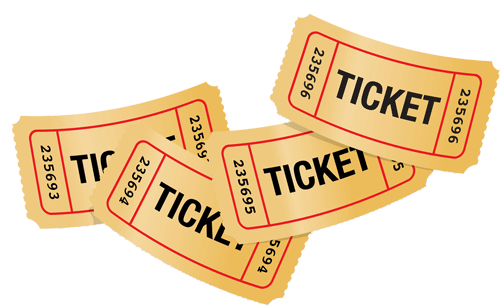Florida is Now the Center of Attention – continuted…
 Here’s the Ticket!
Here’s the Ticket!
In response to my TRR #19 Breaking News story “Florida is Now the Center of Attention”, Tom Fricke, well-known amusement and gaming attorney, has submitted his response. Tom has some great advice. This is a must read. I learned some new information.
Tom Fricke Response to Frank
“You and I are private U.S. Attorneys General, thanks to federal RICO. Most states have their own RICO statutes. That makes private attorneys general out of residents of those states. These laws allow us to sue businesses that are harming our business through conducting as a business any one of several predicate offenses. Illegal gambling is one of those predicate offenses. The successful plaintiff in a civil RICO statute can obtain (1) a closure order, (2) attorney fees, and (3) 3 X actual damages proved. For those who are serious, there is the option of suing the Internet cafe that conducts an illegal sweepstakes. So, let’s see who is serious, other than us editorial writers.
I’ve said to you that whether an Internet cafe that offers a sweepstakes which mimics the slot machine experience is lawful or unlawful in most states is not determined by the slot machine experience or the subjective response to it by the public. Rather, the lawfulness of the promotional game must be established by:
(1) a legitimate product offered for legitimate sale and actually sold and used, +
(2) an alternative method of free participation that is not illusory under the circumstances, +
(3) a clear purpose of the business to sell the product, rather than have the product be an excuse for the game.
These are fact questions for juries. In the case of abuses that I have seen, these facts can be readily proved. But you have to be careful. Some Internet cafe sweepstakes operations are very lucrative. They can and do buy a lot of representation.
The abusive Internet sweepstakes cafe is one which sells “thin air” which nobody actually uses, and says that the game is free when in fact it isn’t free at all. Such businesses are vulnerable to both prosecution and civil RICO. A suit by a FEC could close one down on the testimony of experts in products and markets and on promotional marketing. More to the point, many abusive Internet cafe sweepstakes operators would likely close their doors upon being served with a civil RICO complaint, and Law Enforcement would love the plaintiff in such a case. The only hitch is that people who live in glass houses shouldn’t throw stones.
It’s clear that the proliferation of abuses of the no-consideration compliance theory has been extremely profitable for some people and at the same time, has caused excessive responses by state legislatures. But who is to blame? It’s the abusers, to be sure, but not only them. It’s also:
(1) Law Enforcement for tolerating the abuses rather than bringing cases effectively against them,
(2) Manufacturers of coin-op games who must make products that operators will actually buy, and
(3) Operators who will buy and use anything which Law Enforcement seems to tolerate.
You will find that the loftiest executive talent will endorse the sale and operation of illegal equipment so long as the competition is doing it and law enforcement doesn’t seem to care. So where do we go from here?
You’re wrong on the law in stating that a competition, in which the most-skilled participant almost always wins, makes the competition skill-predominant. I’ve attached a precedent from your state that says so, and could offer many others. [Click here to read New Jersey Case-Is Backgamnon a game of skill or chance?]
You’re wrong also in suggesting that independent testing laboratories are a solution. I can show you some examples of their skill opinions that (1) found as a no-chance game machine a device that was clearly a game of chance and had been found to be so by appellate courts in twenty states, (2) developed a skill standard for crane machines that assured that the machine would operate at a loss, and (3) authored an opinion on a purported skill game that an appellate court relied on in its finding that the machine in question was a game of chance.
Independent testing laboratories describe the function of electronic equipment and software. They compare the result of their analysis to detailed compliance specifications. But in the case of concept-based prohibition of chance, there are no detailed compliance specifications about the line between chance and skill. And let’s not forget that the services of ITLs are very expensive.
What then is the solution? I say the solution starts with a white-paper position statement by our two national trade associations. The American Gaming Association can do that sort of thing. (The AGA has published a twenty-page white paper about video sweepstakes in Ohio.) Why can’t the amusement associations? I’m not suggesting platitudes, such as “we should all obey the law.” I’m suggesting a substantial document that is specific on many points. Yes we can, even when we are dealing with a gray area that too few seem to understand.
The next step would be approval of model legislation and some tools for reference by state lobbyists; but we’d better be careful. An industry defined as businesses of all sizes that deploy machines to public space that people use for fun, is pretty diverse. I don’t think there is a route business anywhere that would not welcome the chance to offer unregulated video poker. ($100 daily net win is pretty attractive.) Larger businesses are no different. Many have succeeded in accomplishing just that. Those who haven’t done so, I’m sure, envy those who have.
We will not effectively respond to the threat of unenlightened, repressive new laws unless substantial resources are deployed to:
(1) achieve a broad consensus among the many parts of our diverse industry,
(2) achieve effective lobbying in states where now there is none, and
(3) develop amusement games played for prizes that are compliant and that people like to play.
In the coin-op/LBE industries, there are vested interests opposed to all of these measures.
Tom Fricke, (314)322-9526, [email protected].
Frank’s Response
Tom, you make several good points. Yes, we are a diverse industry but there are enough FECs and game operators who want to operate games that are legal. We are in agreement that ‘legal’ is a term that cannot be precisely defined, so there will always be challenges. For example, even a football game has an element of chance, especially if one considers a coin toss at the start to determine which team kicks off and which team receives. I understand that, but it can’t hurt to be able to show that an amusement game is predominantly skill and that a respected testing lab has done an analysis and states that the game is predominantly skill.
My first 15 years in this business were spent (along with other operators and associations) convincing legal authorities that pinball machines were games of skill and winning a free game was not gambling. And we as an industry were very successful. We then tackled redemption games and cranes and were also successful. This took another 20 years to accomplish. Hopefully all of the time, energy, and money spent have been worthwhile.
I believe this is a good foundation to start with and then we can proceed with each of the steps you have outlined. Your last sentence stating that there are vested interests within the industry that are opposed to each the solutions also needs to be solved. Every industry has those that will always push the envelope. I have gone on record stating that a line has to be drawn between amusement and gaming. Yes, the line moves left and right and even up and down over time, its position in space sometimes moved by public perception and other times by technology or just plain creativity. This is the nature of our industry.
All comments are welcome. Send directly to me at [email protected]
——————————————————————————
Reader Comments
Frank,
Thank you for providing me your periodic Redemption & FEC Report. I was particularly pleased you provided such great insight into the plight of Florida FECs. I suspect a majority of Florida FECs are either unaware of the law or “burying their heads in the sand” hoping the problem resolves itself. Hopefully your articles will act as a catalyst to move Florida FECs to be proactive in developing a workable solution to correct the unintended consequences of the Florida Legislature’s gaming bill.
Kind regards,
Bill Lupfer, President & CEO
Florida Attractions Association, 1114 N Gadsden Street, Tallahassee, FL, 32303
Frank’s Response
Bill, Thank you for your comments. AMOA is working closely with the New Amusement Machine Owners Association of Florida (AMOAF) to try and amend Florida’s existing laws that apply to game prize limits, which currently requires a 50-game minimum for FECs and does not allow for amusement games to be operated by any other means than coins, tokens and bills. I am hopeful that many of Florida’s FECs and bowling centers will join the association and supoort their efforts.
For more information or to join the AMOAF, contact Phil Juckem at (813) 259-9495 or [email protected]. Visit their website at www.amoaf.com.
——————————————————————————



